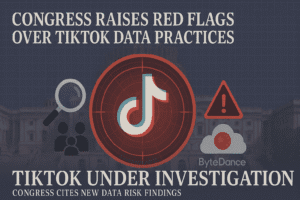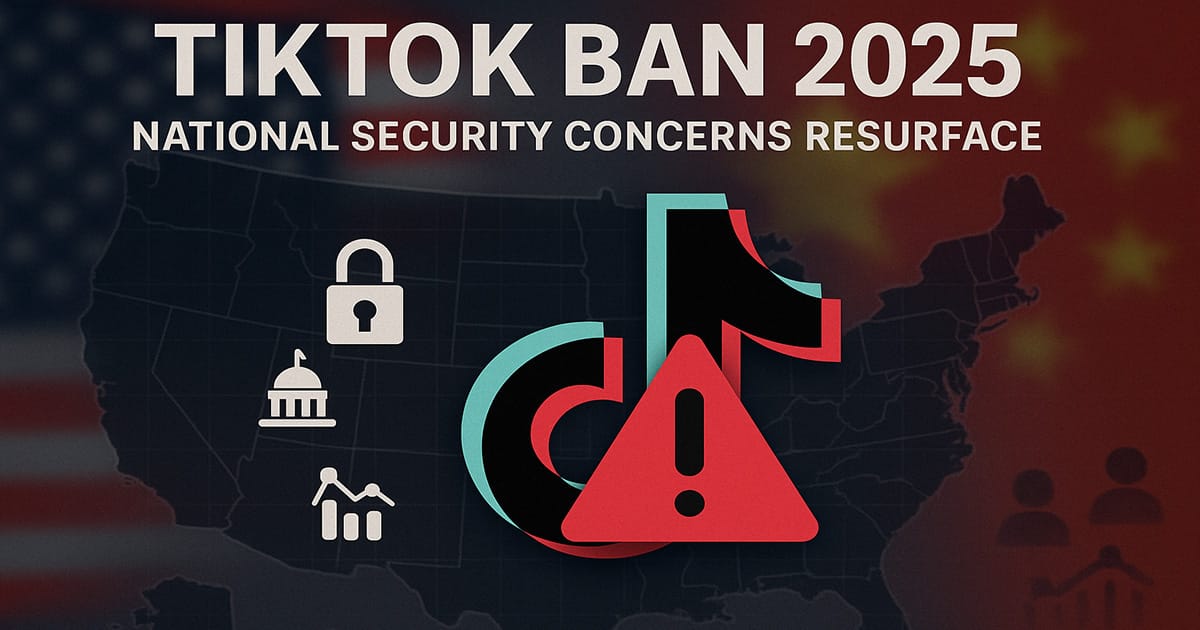Data Privacy Fears Drive New Momentum Toward TikTok Ban
As global tensions escalate and digital privacy issues gain urgency, U.S. lawmakers are turning renewed attention to TikTok, raising fresh concerns about its operations and potential national security implications. Members of both the Senate and House are raising fresh alarms about the potential national security risks posed by the popular short-form video app, which is owned by the China-based tech giant ByteDance. They argue that TikTok’s data collection practices — including access to users’ locations, contacts, and behavioral patterns — could be exploited by the Chinese government under national intelligence laws.
The renewed push comes after multiple closed-door briefings with intelligence officials, who reportedly warned of ongoing vulnerabilities in the app’s infrastructure. Some lawmakers also expressed concerns about TikTok’s growing influence on public opinion, particularly among young Americans, and its potential use as a tool for propaganda or misinformation.
TikTok maintains that it keeps U.S. user data separate from foreign access and operates under strict internal controls. Despite launching its “Project Texas” plan to localize data storage, doubts continue to grow among lawmakers and digital privacy experts who question the platform’s overall transparency and risk management. Growing skepticism from lawmakers and privacy advocates is once again pushing Congress to consider tighter oversight of TikTok. With concerns mounting ahead of the 2024 election, new legislation calling for stricter regulation—or even a possible TikTok Ban—is rapidly gaining momentum, highlighting the app’s growing role in U.S. national security debates.
Congress Alarmed by New Data Risks in TikTok Investigations
Recent investigations by U.S. intelligence and cybersecurity experts have highlighted potential vulnerabilities in how TikTok handles user data. Reports suggest that sensitive information collected from American users — including location history, device identifiers, and behavioral data — could be accessible to foreign entities, particularly linked to China. These findings have triggered growing bipartisan concern in Congress, with lawmakers from both parties demanding stricter oversight and greater transparency from TikTok’s parent company, ByteDance. While the company denies any wrongdoing and insists it complies with U.S. privacy laws, officials argue that national security risks remain unresolved. As congressional pressure mounts, proposals to increase regulation or enforce a complete TikTok Ban are once again gaining serious traction ahead of the 2024 election.


Bipartisan Support Grows for Stricter Regulation of Foreign-Owned Apps
Proposed legislation targeting data security and foreign-owned digital platforms is gaining strong momentum in Congress. Both Democrats and Republicans are expressing unified concern over the risks associated with TikTok, especially due to its ties to China-based parent company ByteDance. Lawmakers are reviewing multiple bills that could either introduce stricter compliance measures or authorize federal authorities to take decisive action against platforms deemed threats to national interest. Some proposals focus on enhanced transparency and mandatory U.S.-based data storage, while others aim to restrict the app’s operations entirely. The growing bipartisan support indicates that regulatory action could arrive sooner than previously expected.
TikTok Defends Data Practices Amid Rising U.S. Scrutiny
TikTok continues to assert that it operates as an independent company with no direct control or influence from the Chinese government. In response to growing scrutiny from U.S. lawmakers and regulatory bodies, the company has emphasized that it stores American user data on servers located within the United States, with additional backup in Singapore. As part of its response to regulatory scrutiny, TikTok has rolled out “Project Texas,” a multi-billion-dollar framework developed in collaboration with U.S. tech firms.
The company says this effort underscores its intention to secure user information within American borders and align with national security expectations. Company executives have repeatedly stated that no data is shared with Chinese authorities and that all access protocols are managed in compliance with U.S. privacy laws. Despite these assurances, critics remain skeptical, citing potential vulnerabilities and lack of third-party verification. The platform’s popularity among younger demographics, combined with its ownership by China-based ByteDance, continues to fuel concerns in Washington, where lawmakers are pushing for greater oversight of foreign-owned tech platforms operating in the U.S. digital ecosystem.


Experts Highlight Risks to Free Speech and Digital Economy
Experts are raising concerns about the broader consequences that regulatory action against TikTok could trigger in the digital landscape. Analysts suggest that restricting or removing a major global platform may set a precedent that challenges digital free speech and platform neutrality. Content creators, many of whom rely on TikTok for income and audience engagement, could face significant economic disruption. Additionally, experts warn that such moves may strain diplomatic ties with other countries and further escalate tensions in ongoing tech conflicts between the U.S. and China. Beyond security concerns, the issue now reflects a deeper debate over internet governance, economic impact, and international technology policy.
Massive U.S. User Base Raises Questions About Policy Enforcement
With over 150 million users in the United States alone, TikTok has become one of the most widely used and downloaded apps in the country. Its immense popularity, particularly among younger demographics, raises serious questions about how any potential restrictions or regulatory actions would be enforced. Experts suggest that removing or limiting access to such a widely adopted platform could lead to significant user backlash and challenges in implementation. The scale of its user base highlights the complexity of balancing national security concerns with public demand and digital engagement.
New Ban Threat on TikTok Seen as More Credible This Time
This is not the first time that TikTok has faced the threat of being restricted in the United States, but experts believe the current situation is more serious than previous attempts. With U.S.–China relations becoming increasingly strained over issues like technology, trade, and cybersecurity, lawmakers are under greater pressure to act decisively. Adding to that is the high-stakes political atmosphere of an election year, where national security remains a top priority for both parties. The TikTok Ban is being viewed not just as a policy decision, but also as a reflection of broader geopolitical concerns. Analysts suggest that the timing, public sentiment, and bipartisan support could give this renewed effort more momentum than any previous attempts.
You might also like
- Biden and Trump Debate 2024: A Turning Point in the U.S. Presidential Election
- Exciting PS6 News Update: Release Window & Key Features
Join our official WhatsApp Channel RealSource24 for breaking news, trending headlines, and real-time alerts — all in one place!👉 Click here to Join Now
